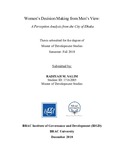| dc.contributor.advisor | Hossain, Md. Shanawez | |
| dc.contributor.author | M. Salim, Radiyah | |
| dc.date.accessioned | 2019-07-28T08:40:33Z | |
| dc.date.available | 2019-07-28T08:40:33Z | |
| dc.date.copyright | 2018 | |
| dc.date.issued | 2018-12 | |
| dc.identifier.other | ID 17162005 | |
| dc.identifier.uri | http://hdl.handle.net/10361/12428 | |
| dc.description | This Thesis is submitted in partial fulfillment of the requirements for the degree of Masters of Development Studies, 2018. | en_US |
| dc.description | Cataloged from PDF version of Thesis. | |
| dc.description | Includes bibliographical references (page 39-41). | |
| dc.description.abstract | The ability of women to make decisions that affect the personal circumstances of their own lives is an essential aspect of empowerment and serves as an important contributor to women’s overall welfare. There has been progress towards the equal representation of men and women in decision-making in the past ten years. Economists often believe that the family decision-making process is the outcome of conscious choices of each spouse, and the decision-making power of each spouse is determined by economic as well as non-economic factors. The gender status is a vital aspect that influences the decisions of men and women in any family, and the factors that influences the power that husbands, or wives wield in a family determines the decision-making process of the unit. The study was an attempt to dig into the men’s mind to understand how they perceive women’s participation in decision making in their households, and the influencing factors for their perceptions. Mixed method was used in this study using data collected through a questionnaire and focus group discussion from a sample of middle class married men to investigate the nature and freedom of women decision making from their view. Findings of this study suggested that majority of the surveyed men believe higher education is the most important socioeconomic factor for women to have decision making capability. The findings also reflect an interest by the respondents to be more involved in the lives of their children and in their domestic life. | en_US |
| dc.description.statementofresponsibility | Radiyah M. Salim | |
| dc.format.extent | 49 pages | |
| dc.language.iso | en | en_US |
| dc.publisher | Brac University | en_US |
| dc.rights | Brac University Theses are protected by copyright. They may be viewed from this source for any purpose, but reproduction or distribution in any format is prohibited without written permission. | |
| dc.subject | Women empowerment | en_US |
| dc.subject.lcsh | Women in development--Bangladesh. | |
| dc.subject.lcsh | Women in development--Bangladesh. | |
| dc.title | Women’s decision making from men’s view: a perception analysis from the city of Dhaka | en_US |
| dc.type | Thesis | en_US |
| dc.contributor.department | BRAC Institute of Governance and Development, Brac University | |
| dc.description.degree | M. Development Studies | |

